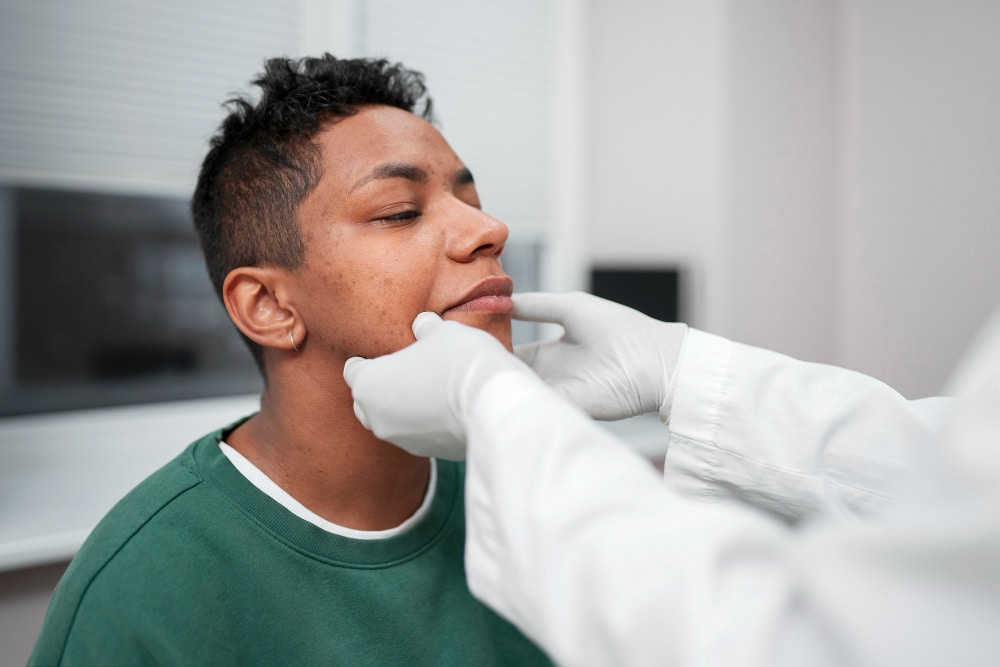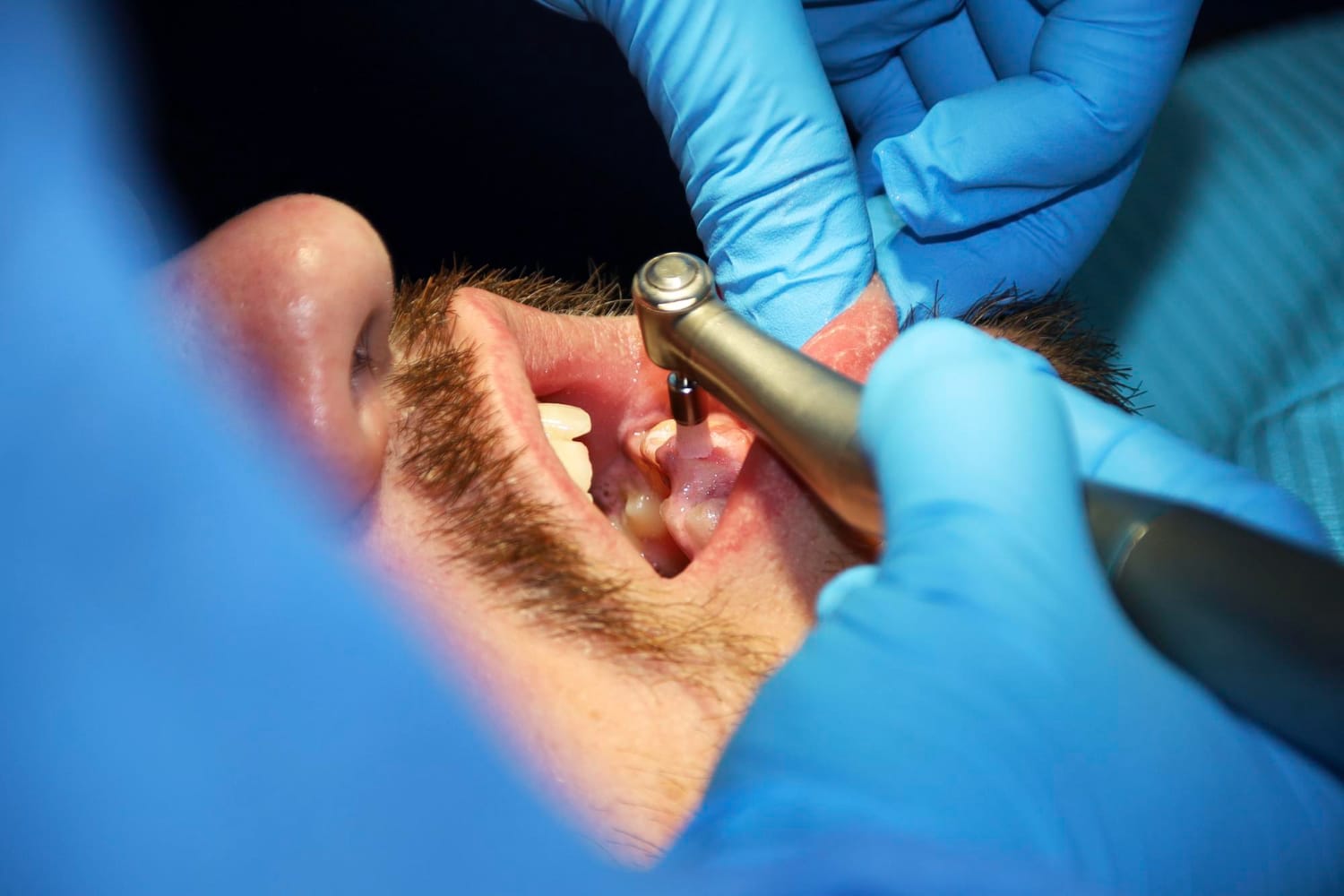Are you confused about the differences between oral surgery and jaw surgery? You’re not alone. Many people use these terms interchangeably, causing confusion among patients seeking a smile makeover. In this article, we will navigate the distinctions between oral surgery and jaw surgery, helping you make informed decisions about your dental care.
Oral surgery primarily involves the treatment of oral diseases, tooth extraction, dental implant placement, and correcting facial and oral irregularities. On the other hand, jaw surgery, also known as orthognathic surgery, focuses on correcting significant skeletal and dental irregularities that affect the bite, facial structure, and overall oral health.
Understanding the differences between these procedures is vital, as each addresses unique dental concerns and requires specialized expertise. By knowing what differentiates oral surgery from jaw surgery, you can better communicate with your dentist or oral surgeon, enabling them to develop a personalized treatment plan tailored to your needs.
Join us as we explore the nuances between oral surgery and jaw surgery, helping you navigate the path to your dream smile with confidence and clarity.
Understanding Oral Surgery and Jaw Surgery
Oral surgery encompasses a wide range of procedures aimed at treating various oral diseases and conditions. It involves diagnosing and treating oral pathologies, removing impacted wisdom teeth, performing dental implant surgeries, and addressing facial and oral irregularities. Oral surgeons are dental specialists who undergo additional training to perform these complex surgical procedures.
One of the most common reasons for oral surgery is the removal of impacted wisdom teeth. Wisdom teeth, also known as third molars, often do not have enough space to fully emerge, leading to pain, infection, and damage to adjacent teeth. An oral surgeon can remove these teeth under local anesthesia or sedation, providing relief from discomfort and preventing future oral health issues.
Oral surgery is also frequently used for dental implant placement. Dental implants are artificial tooth roots made of biocompatible materials, such as titanium, that are surgically implanted into the jawbone. Oral surgeons are specially trained to ensure precise implant placement, which is crucial for the success and longevity of the restoration. This procedure is ideal for individuals with missing teeth who want a long-lasting and natural-looking solution.
In addition to tooth extractions and dental implant placement, oral surgery can correct facial and oral irregularities. This may involve procedures such as bone grafting to restore lost bone structure, orthognathic surgery to correct jaw misalignment, or soft tissue surgeries to enhance the appearance of the gums or lips. These procedures can significantly improve both the functionality and aesthetics of the smile.

Common Reasons for Oral Surgery
- Impacted Wisdom Teeth Removal: As mentioned earlier, impacted wisdom teeth can cause pain, infection, and damage to adjacent teeth if not removed. Oral surgery is often necessary to extract these teeth and prevent further complications.
- Dental Implant Placement: Dental implants are an excellent solution for individuals with missing teeth. Oral surgeons are skilled in performing the surgical placement of dental implants, ensuring a successful and long-lasting restoration.
- Correction of Facial and Oral Irregularities: Oral surgery can correct various facial and oral irregularities, such as jaw misalignment, bone loss, or gum and lip enhancements. These procedures can improve both the functionality and aesthetics of the smile, enhancing overall oral health and self-confidence.
Common Reasons for Jaw Surgery
Jaw surgery, also known as orthognathic surgery, is a specialized surgical procedure that focuses on correcting significant skeletal and dental irregularities that affect the bite, facial structure, and overall oral health. While oral surgery addresses a wide range of dental concerns, jaw surgery is typically reserved for more complex cases that require extensive skeletal adjustments.
One of the primary reasons for jaw surgery is correcting a severe malocclusion, also known as a misaligned bite. A misaligned bite can cause problems with chewing, speech, and overall oral health. Jaw surgery repositions the jaws to align them properly, allowing for a harmonious bite and improved facial aesthetics.
Jaw surgery is also used to address skeletal discrepancies that can impact the appearance and functionality of the face. Conditions such as a receding or protruding jaw, facial asymmetry, or open bite can be corrected through orthognathic surgery. By repositioning the jaws, jaw surgery can enhance facial balance and harmony, resulting in a more aesthetically pleasing smile.
Patients with obstructive sleep apnea or breathing difficulties may also benefit from jaw surgery. In some cases, a small or retruded jaw can contribute to airway obstructions, leading to sleep apnea and other respiratory problems. By advancing the jaws, jaw surgery can open up the airway and improve breathing patterns, providing relief from sleep apnea symptoms and promoting better overall health.
In summary, jaw surgery is a specialized form of oral surgery that specifically targets significant skeletal and dental irregularities. It is typically reserved for cases that require extensive adjustments to the jaws to correct bite issues, improve facial aesthetics, and enhance overall oral health.
The Differences Between Oral Surgery and Jaw Surgery
Oral surgery and jaw surgery are both important branches of dentistry, but they differ in terms of the procedures they involve and the dental conditions they address.
Oral Surgery: Oral surgery encompasses a wide range of procedures that primarily focus on the mouth, teeth, and surrounding structures. It involves the diagnosis and treatment of oral diseases, tooth extraction, dental implant placement, and correcting facial and oral irregularities.
Oral surgeons are dental specialists who have undergone years of additional training beyond dental school. They possess the expertise to perform complex surgical procedures with precision and care. Oral surgery is often performed under local anesthesia, intravenous sedation, or general anesthesia, depending on the specific procedure and the patient’s needs.
One common oral surgery procedure is wisdom tooth extraction. Wisdom teeth, also known as third molars, often erupt improperly or become impacted, causing pain, infection, and other dental problems. Oral surgeons are skilled in removing wisdom teeth safely and efficiently, relieving patients of discomfort and preventing further complications.
Another area where oral surgery excels is dental implant placement. Dental implants are a popular solution for replacing missing teeth, providing a stable and natural-looking alternative to dentures or bridges. The oral surgeon carefully places the dental implant into the jawbone, allowing it to fuse with the bone over time. This procedure requires precision and expertise to ensure the implant’s long-term success.
Jaw Surgery: Jaw surgery, also known as orthognathic surgery, involves the correction of significant skeletal and dental irregularities that affect the bite, facial structure, and overall oral health. It goes beyond the scope of oral surgery and requires the expertise of an oral and maxillofacial surgeon.
Jaw surgery is often recommended for individuals with severe malocclusions (misaligned bites) that cannot be corrected through orthodontic treatment alone. These malocclusions can cause functional problems, such as difficulty chewing or speaking, as well as aesthetic concerns. Jaw surgery aims to reposition the jaws, improving the bite, facial symmetry, and overall oral function.
The process of jaw surgery begins with a comprehensive evaluation by the oral and maxillofacial surgeon. This evaluation involves the use of advanced imaging techniques, such as X-rays and 3D scans, to assess the precise nature of the skeletal irregularities. Once a diagnosis is made, the surgeon will develop a personalized treatment plan that may involve orthodontic preparation before the actual surgery.
During jaw surgery, the oral and maxillofacial surgeon makes precise incisions in the jawbones, repositions them, and secures them in their new position using plates, screws, or wires. This procedure requires meticulous planning, as even small adjustments can have a significant impact on the patient’s bite and facial aesthetics. After the surgery, patients may require a period of orthodontic treatment to fine-tune their bite and ensure long-term stability.

The Importance of Proper Diagnosis and Treatment Planning
Whether you require oral surgery or jaw surgery, the importance of proper diagnosis and treatment planning cannot be overstated.
A thorough evaluation by a qualified dentist or oral surgeon is crucial in determining the most appropriate course of action for your specific dental concerns. This evaluation may involve a comprehensive examination, X-rays, and other diagnostic tests to assess the condition of your teeth, jaws, and supporting structures.
For oral surgery procedures, such as tooth extraction or dental implant placement, the dentist will evaluate your oral health, determine the best approach for treatment, and discuss the expected outcomes and potential risks. They will also consider your medical history and any medications you may be taking to ensure your safety during the procedure.
In the case of jaw surgery, a comprehensive evaluation by an oral and maxillofacial surgeon is essential. The surgeon will assess the nature and severity of your skeletal irregularities, evaluate your bite, facial aesthetics, and overall oral health, and develop a customized treatment plan that addresses your specific needs. This may involve collaboration with an orthodontist to ensure proper alignment of the teeth before and after the surgery.
Proper diagnosis and treatment planning not only ensure optimal results but also help manage patient expectations. Understanding the potential outcomes, risks, and recovery process allows you to make an informed decision about your dental care. It also allows your dental team to provide you with the necessary support and guidance throughout your treatment journey.
Finding the Right Oral Surgeon or Maxillofacial Surgeon
When it comes to oral surgery or jaw surgery, finding the right oral surgeon or maxillofacial surgeon is crucial for a successful outcome. Here are some factors to consider when selecting a dental professional:
Qualifications and Expertise: Look for a dentist or oral surgeon who has the necessary qualifications, training, and experience in performing the specific procedure you require. Oral surgeons should be board-certified, indicating that they have met the highest standards in their field. Additionally, look for a surgeon who specializes in the procedure you need, whether it’s dental implant placement or orthognathic surgery.
Reputation and Reviews: Research the reputation of the dental professional or practice you are considering. Read online reviews, ask for patient testimonials, and seek recommendations from trusted sources. A positive reputation and satisfied patients can give you confidence in the quality of care you will receive.
Communication and Comfort: It is essential to feel comfortable and confident in your dental professional’s ability to communicate effectively and address your concerns. Schedule a consultation before committing to any treatment to discuss your goals, ask questions, and assess the dentist’s communication style and bedside manner.
Facilities and Technology: Consider the facilities and technology available at the dental practice. State-of-the-art equipment and modern techniques can improve the accuracy, efficiency, and comfort of your treatment. Additionally, a clean and welcoming environment can contribute to a positive dental experience.
Cost and Insurance Coverage: Dental procedures can vary in cost, so it is important to inquire about the fees involved. Ask about insurance coverage, payment plans, and financing options to ensure that the treatment you need fits within your budget.
By taking the time to research and select the right oral surgeon or maxillofacial surgeon, you can have confidence in their expertise and ensure a smooth and successful treatment experience.
Frequently Asked Questions about Smile Makeovers
To further clarify the distinctions between oral surgery and jaw surgery, let’s address some frequently asked questions that patients often have regarding these procedures:
- What is oral surgery?: Oral surgery, also known as oral and maxillofacial surgery, encompasses various procedures aimed at diagnosing and treating diseases, injuries, and defects affecting the mouth, jaw, and facial structures. It includes tooth extraction, dental implant placement, treatment of oral infections, removal of cysts or tumors, and correction of facial and oral irregularities.
- What is jaw surgery?: Jaw surgery, technically known as orthognathic surgery, focuses on correcting significant skeletal and dental irregularities that affect the bite, facial structure, and overall oral health. It involves repositioning the jaws to achieve proper alignment, improving facial symmetry, resolving bite issues (such as overbite or underbite), and enhancing the overall function and aesthetics of the jaw and face.
- When is oral surgery recommended?: Oral surgery may be recommended for various reasons, including impacted wisdom teeth removal, dental implant placement, treatment of oral infections or abscesses, biopsy or removal of oral tumors or cysts, and correction of facial or oral irregularities. Your dentist or oral surgeon will evaluate your specific condition and determine if oral surgery is the appropriate course of treatment.
- When is jaw surgery necessary?: Jaw surgery is typically recommended for patients with skeletal irregularities that affect their bite, jaw function, and facial aesthetics. Common conditions that may require jaw surgery include severe overbite or underbite, open bite, crossbite, facial asymmetry, and difficulty chewing or speaking due to jaw misalignment. Your oral surgeon will assess your case and determine if jaw surgery is necessary to address your concerns.
- Can oral surgery and jaw surgery be combined?: In some cases, oral surgery and jaw surgery may be combined to address multiple dental and skeletal issues simultaneously. For example, if a patient requires dental implant placement and correction of a severe overbite, an oral surgeon may perform both procedures in collaboration with other dental specialists. However, the decision to combine surgeries will depend on the individual’s specific needs and the recommendations of the dental or surgical team.
- What is the recovery process like for oral surgery and jaw surgery?: The recovery process for oral surgery and jaw surgery varies depending on the complexity of the procedure and the individual’s healing response. Generally, patients can expect some swelling, discomfort, and temporary dietary restrictions after both types of surgery. The oral surgeon will provide detailed post-operative instructions and prescribe pain medication, if necessary, to manage pain and promote proper healing. Follow-up appointments will be scheduled to monitor your progress and make any necessary adjustments or modifications to your treatment plan.
By addressing these frequently asked questions, we hope to have clarified the distinctions between oral surgery and jaw surgery. Remember, each procedure serves a unique purpose and requires specialized expertise. Consult with your oral surgeon or maxillofacial surgeon to determine the most appropriate treatment plan for your smile makeover.
Conclusion: Achieving a Beautiful and Healthy Smile
Navigating the distinctions between oral surgery and jaw surgery is essential when seeking a smile makeover. Understanding the differences in these procedures will help you communicate effectively with your dentist or oral surgeon, enabling them to develop a personalized treatment plan tailored to your needs.
Whether you require oral surgery for tooth extraction or dental implant placement, or jaw surgery to correct skeletal irregularities and enhance your facial aesthetics, finding the right specialist is crucial. Consider their qualifications, experience, specialization, and communication skills to ensure that you receive the best possible care.
Remember to address any concerns or questions you have during the consultation process. Your oral surgeon or maxillofacial surgeon should be able to provide detailed information about the procedure, potential risks, expected outcomes, and the recovery process.
With the right expertise, communication, and personalized treatment plan, you can achieve a beautiful and healthy smile that boosts your confidence and improves your overall oral health. Don’t hesitate to take the first step towards your dream smile by seeking the guidance of a qualified oral surgeon or maxillofacial surgeon today.






